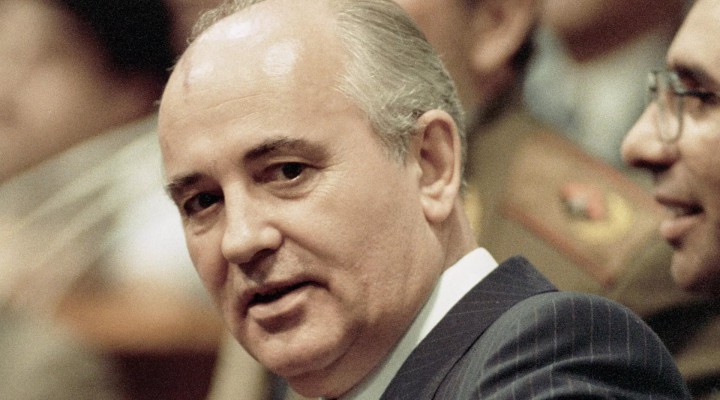Gorbachev Was Promised Non-Expansion of NATO, His Mistake Was to Believe it, Ex-US Official Says

Former President of the Soviet Union Mikhail Gorbachev understood the needless threat of the nuclear Armageddon, but his main mistake was that he did not understand Washington, where any agreement can be rescinded by subsequent presidents, ex-US Assistant Treasury Secretary Paul Craig Roberts told Sputnik.
“He [Gorbachev ] was the best of the younger generation of Communist Party members who understood, like US President Ronald Reagan, the futility of the Cold War and the needless threat of nuclear Armageddon,” Roberts, who served under President Ronald Reagan, said. “Gorbachev also understood that the repressions and hardships of the Soviet years were unnecessary, and he with advisors, some of whom I met and engaged in discussion, attempted to reform the Soviet system. There is no question that he was a great man and a sincere leader of the Soviet peoples.”
Gorbachev died in Moscow on Tuesday at the age of 91 after suffering a long illness. His passing has prompted praise and remembrance from world leaders, including European Commission President Ursula von der Leyen, outgoing UK Prime Minister Boris Johnson and Russian President Vladimir Putin.
Roberts pointed out that President Reagan realized Gorbachev’s greatness. “Reagan also realized that Gorbachev was limited in his ability to end the Cold War by distrustful elements in the Politburo,” he went on to say. “President Reagan’s plan, in which I was a participant, was to rescue the US economy from “stagflation” and then to put pressure of a threatened arms race – Star Wars – on the Soviet Union in order to enhance Gorbachev’s position in favor of ending the Cold War than to subject the struggling Soviet economy to an arms race with a revitalized US economy.”
“Reagan, despite the CIA’s opposition and that of the US military/security complex, carried out his plan not in order to win the Cold War, but, as Reagan repeatedly stressed to all of us involved, to end the Cold War,” Roberts added. “None of us, Reagan included, had any idea of Soviet collapse. Our purpose was to halt a gratuitous conflict that threatened humanity with nuclear Armageddon.”
What the US authorities did not realize, Roberts said, was that hardline elements of the Soviet Communist Party thought that Gorbachev was making too many concessions to the West too soon and without sufficient reciprocal concessions and guarantees.
“Apparently, Gorbachev himself did not realize it. Reagan proceeded with care,” he said. “He invited Gorbachev to the White House.”
Roberts recalled that Reagan convinced the distinguished American pianist, Van Cliburn, to come out of retirement and perform for Gorbachev in the White House.
“Van Cliburn had won, with Khrushchev’s approval, the inaugural International Tchaikovsky Competition in Moscow in 1958,” he noted. “In addition to classics of Russian composers, Van Cliburn regaled Gorbachev with Russian folk songs. President Reagan absolutely forbade any derogatory reference to the Soviet Union. Nothing, not even the CIA, was to prevent the end of the Cold War.”
Roberts shared that after Reagan’s second term ended, he had less connection with his successor, his former vice president, George H. W. Bush.
“But I know for an absolute fact that Secretary of State James Baker gave assurances to Gorbachev that if Gorbachev permitted the unification of Germany, NATO would not move one inch to the East,” he shared. “There is no doubt about this, despite the denials by American neoconservatives and Clinton regime officials.”
Gorbachev in an interview last December said he believed the Soviet Union could have survived even after the August 1991 coup as a Union of Sovereign States. A Gallup poll taken in 2013 revealed that a majority of residents in former republics regretted the collapse of the Soviet Union.
“The Soviet Union collapsed, not because of Reagan, but because the hardline Communists, disturbed, as is understandable, by Gorbachev’s trust in Washington’s word, attempted a coup and placed Gorbachev under house arrest. It was this miscalculation that brought about the collapse of the Soviet government and the rise of Yeltsin, who, intentionally or not, essentially was under Washington’s control,” Roberts said.
Roberts went on to say that Gorbachev, believing, as did Reagan, in the futility of the Cold War, trusted that the conflict was over.
“Gorbachev’s mistake was that he did not understand Washington,” he underscored. “An American president can make an agreement that can be rescinded by a successor. This is the case even if there are signed documents, but in the absence of signed documents, the corrupt Clinton regime was able to claim no such agreement as NATO not moving to Russia’s borders ever existed.
“In view of the Democrat Clinton regime’s overthrowing the Reagan-Gorbachev ending of the Cold War with a New Cold War, now greatly expanded under the Democrat Biden, the Kremlin’s toleration of the West’s declared aggressive intentions against Russia is puzzling,” he added. “How can anyone in the Kremlin ever again believe a word that Washington says? In Russia, Gorbachev is not seen as the great leader that he was. In America, ignorant flag-waving patriots mistakenly base their pride on Reagan winning the Cold War.
“As far as I, a participant, can tell, neither side understands what has happened.”
The late leader is known for opening nuclear arms talks with former US President Ronald Reagan, attempting to reform the Soviet system and serving as the last head of the Soviet Union.
Gorbachev received a number of awards, including the Nobel Peace Prize and the Ronald Reagan Freedom Award.
 TheAltWorld
TheAltWorld 
0 thoughts on “Gorbachev Was Promised Non-Expansion of NATO, His Mistake Was to Believe it, Ex-US Official Says”